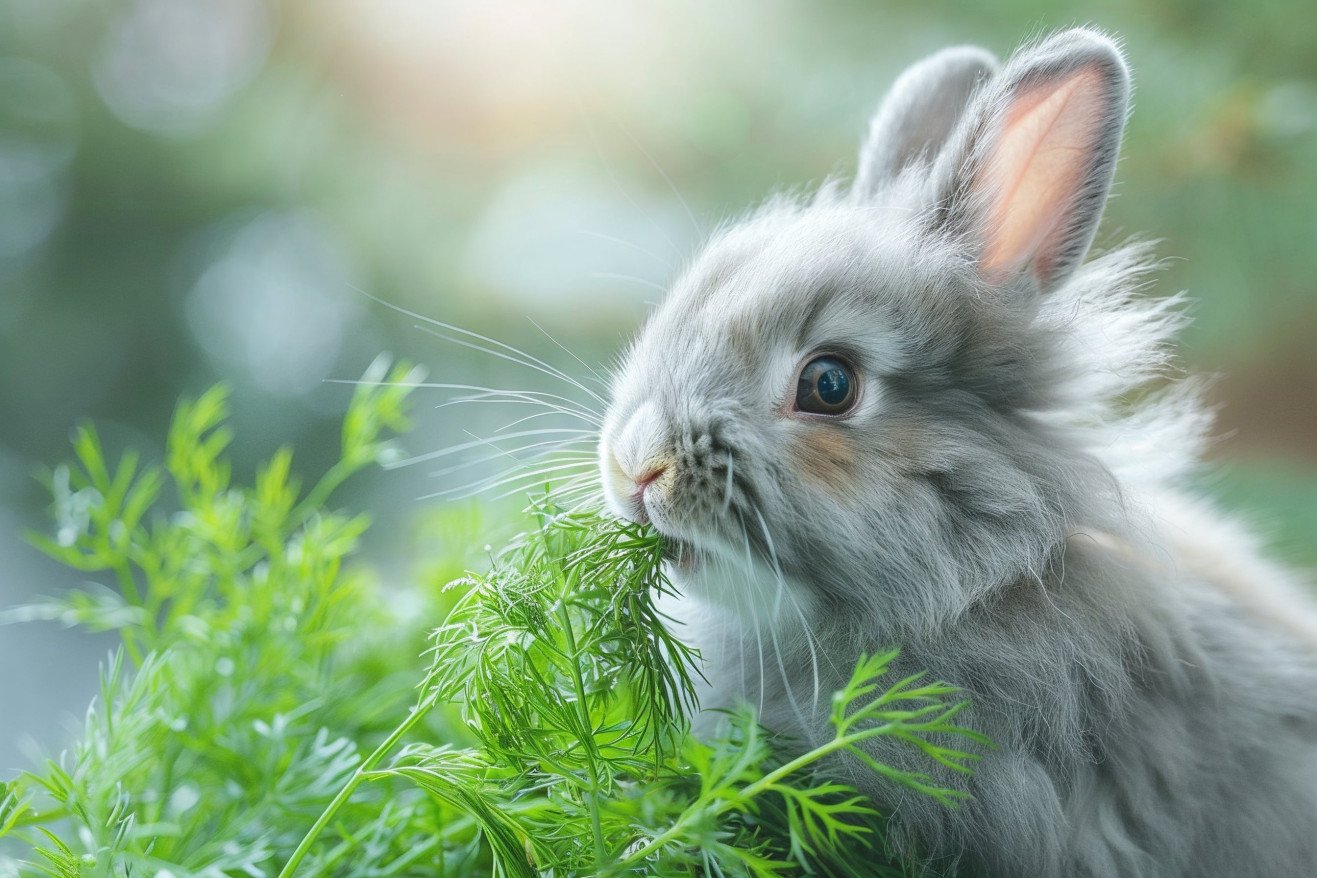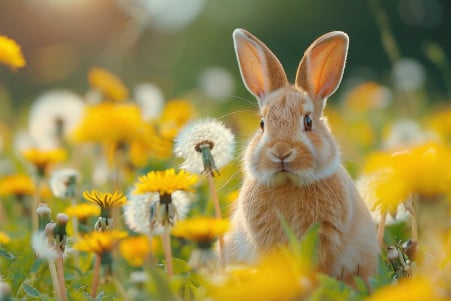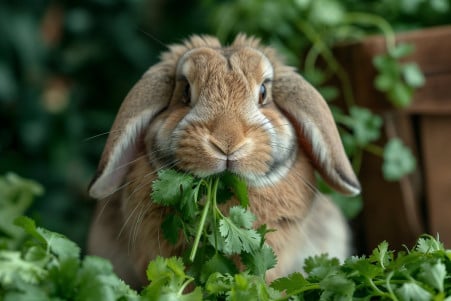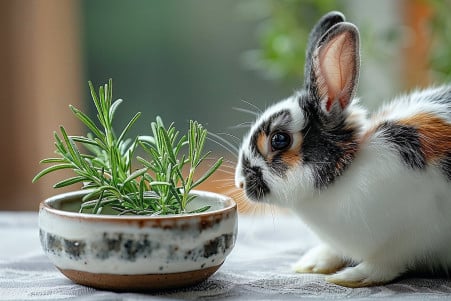Can Rabbits Eat Dill? Benefits and Feeding Guidelines
18 May 2024 • Updated 18 May 2024

If you’re a rabbit owner, you may be curious about whether or not it’s safe and healthy for your pet to eat dill. Luckily, dill is safe for rabbits and can be a healthy addition to their diet when given in moderation. Dill is a good source of vitamins A and C, as well as antioxidants and minerals such as manganese, all of which can be good for rabbits. Dill leaves and stems can be given to rabbits either fresh or dried as a treat.
In this article, we'll take a look at the most up-to-date veterinary insight and expert advice on feeding dill to rabbits. From learning about dill's nutritional content to finding out how much dill you should give your rabbit, you'll get a well-rounded view of how to safely and beneficially add this tasty herb to your rabbit's diet.
Can rabbits eat dill?
Nutritional Benefits of Dill for Rabbits
Dill is a nutrient-dense herb that is loaded with vitamins, minerals, and antioxidants that are good for rabbits. As The Bunny Hub explains, dill leaves are especially high in vitamin C, magnesium, and potassium - all of which are important for a rabbit's health and immune system.
Dill is also high in vitamin A, according to Rabbits.life, which is an antioxidant vitamin that is important for maintaining healthy eyes and a strong immune system. Dill also contains important minerals such as manganese, iron, and calcium. The USDA nutrient database lists dill's nutritional content.
In addition, dill contains flavonoids and phenolic compounds, which are antioxidants that can help protect rabbits from oxidative stress and related health problems. As Bunny Meadow explains, dill can also help increase appetite and calm digestive issues, making it a tasty and helpful herb for rabbits. By giving rabbits this nutrient-dense herb, rabbit owners can ensure that their pets get important vitamins, minerals, and antioxidants while keeping their diets interesting.
Recommended Dietary Portions and Nutritional Information for Dill
Per The Bunny Hub, the recommended portion size for rabbits is 1 tablespoon of fresh or dried dill per 2 pounds of body weight, 1-2 times per week. Dill should be given as a treat and not as a staple in a rabbit's diet. Central Victoria Hay also suggests that dill be introduced slowly and that rabbits be observed for any changes in digestion or signs of allergies.
For the healthiest option, Arizona Exotics suggests that fresh, organic dill is better than store-bought dill, which may contain pesticide residues. It's also important to prepare dill properly by washing it and removing any parts that are discolored or wilted before feeding it to rabbits.
Feeding Different Parts of the Dill Plant
The leaves, stems, and flowers of the dill plant are safe for rabbits to eat. As noted by The Educated Rabbit, dill leaves and stems can be given to rabbits fresh or dried as a supplement or treat to their regular diet. The site also explains that dill flowers are safe for rabbits to eat and can add some variety and nutrients to their diet.
That said, Pets on Mom.com warns that dill seeds are not safe for rabbits to eat because they can be a choking hazard and cause digestive upset. It's also important to remember that whenever you introduce a new part of the dill plant to your rabbit, you should watch them for any signs of a reaction and adjust the amount you give them as needed, as pointed out by the BinkyBunny forum.
Fresh vs. Dried Dill: Pros and Cons
While both fresh and dried dill are good choices for rabbits, there are some differences between the two. As mentioned by Bunny Meadow, fresh dill offers the most nutrients and flavor but doesn't last as long as dried dill. Dried dill is a good option if you want something that will last longer and still offer most of the nutritional benefits of fresh dill. However, as mentioned by Can Rabbits Eat Dill?, dried dill may not be as aromatic or flavorful as fresh dill.
In order to ensure that both fresh and dried dill stay fresh and safe for rabbits to eat, it's important to store and prepare them properly. When choosing between fresh and dried dill, rabbit owners should also think about their own needs in terms of convenience as well as their rabbit's dietary requirements and taste preferences.
Potential Dangers and Symptoms of Overconsumption
Although dill is safe for rabbits, there are some potential risks associated with overconsumption. According to Can Rabbits Eat Dill?, dill’s high fiber content can lead to digestive issues such as diarrhea, gas, or bloat if it is consumed in large amounts. In addition, Hastings Veterinary Hospital states that dill’s high calcium content can lead to bladder sludge or urinary problems.
Symptoms of overconsumption or intolerance include loss of appetite, lethargy, or changes in stool, according to the RSPCA. If any of these symptoms occur, feeding should be stopped immediately and a veterinarian should be contacted if the symptoms don’t clear up.
It’s important to feed rabbits dill in moderation. This means that proper serving sizes, introducing dill to your rabbit’s diet slowly, and keeping an eye out for any adverse reactions are all important steps to take to ensure that dill is a safe and healthy addition to your rabbit’s diet.
Conclusion: Adding Dill to a Healthy Rabbit Diet
Dill can be a nutritious and tasty part of a rabbit's diet, as long as it's given in moderation and as part of a balanced diet. Stick to the recommended portion sizes of 1 tablespoon of fresh or dried dill per 2 pounds of body weight, 1-2 times per week, and make sure to introduce dill slowly to avoid digestive upset.
Choose fresh, organic dill whenever possible, and make sure to wash it and remove any parts that look wilted or discolored before giving it to your rabbit. Pay attention to your rabbit's response when you introduce dill or any other new food, and adjust portion sizes as needed. If you have any questions or concerns about giving your rabbit dill or other herbs, talk to your vet.


